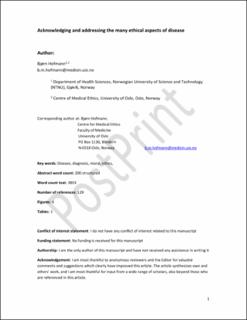| dc.description.abstract | Diseases change the life of individuals, the social status of groups, the obligations of professionals, and the welfare of nations. Disease classifications function as a demarcation of access to care, rights, and duties. Disease also fosters social stigmatization and discrimination, and is a personal, professional, and political matter. It raises a wide range of ethical issues that are of utmost importance in patient communication and education. Accordingly, the objective of this article is to present and discuss a range of basic ethical aspects of this core concept of medicine and health care. First and foremost, disease evokes compassion for the person suffering and induces a moral impetus to health professionals and health policy makers to avoid, eliminate or ameliorate disease. The concept of disease has many moral functions, especially with respect to attributing rights and obligations. Classifying something as disease also has implications for the status and prestige of the condition as well as for the attitudes and behavior towards people with the condition. Acknowledging such effects is crucial for avoiding discrimination and good communication. Moreover, different perspectives on disease can create conflicts between patients, professionals and policy makers. While expanding the concept of disease makes it possible to treat many more people for more conditions - earlier, it also poses ethical challenges of doing more harm than good, e.g., in overdiagnosis, overtreatment, and medicalization. Understanding these ethical issues can be difficult even for health professionals, and communicating them to patients is challenging, but crucial for making informed consent. Accordingly, acknowledging and addressing the many specific ethical aspects of disease is crucial for patient communication and education. | en_US |

